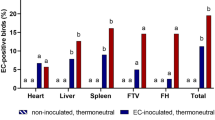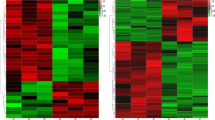Abstract
Gastrointestinal parasites are an important health issue in grazing ruminants. Understanding the processes involved in the transition from the free living to the parasitic life stage of these nematodes is one avenue to identifying new targets amenable to future intervention. The transition to parasitism is initiated by exsheathment and is triggered by the sudden change in environment after ingestion of the infective larva by the host. Two major changes in environment are the increases in temperature and carbon dioxide (CO2) levels. For CO2 a role in exsheathment has been described previously, but the exact role of temperature was unclear. The current study is the first to investigate the importance of temperature in triggering exsheathment of Haemonchus contortus. Carbon dioxide induced exsheathment in H. contortus proved to be temperature dependent, as no exsheathment was observed at room temperatures. However, the temperature requirement to trigger exsheathment was quite specific. A rapid change in temperature (heat shock) very efficiently induced high levels of exsheathment. In contrast, when the larvae were exposed to a slow increase in temperature, the exsheathment response was smaller and delayed. Further investigation revealed that timing of the heat shock in relation to the CO2 administration was crucial, as well as the final temperature and magnitude of the heat shock. In conclusion, these data indicate that heat shock rather than temperature itself is a crucial aspect in triggering the biological exsheathment cascade, and thus infection process, of H. contortus.



Similar content being viewed by others
References
Berbigier P, Gruner L, Mambrini M, Sophie SA (1990) Faecal water content and egg survival of goat gastro-intestinal strongyles under dry tropical conditions in Guadeloupe. Parasitol Res 76:379–385
Campbell LR, Gaugler R (1991) Mechanisms for exsheathment of entomopathogenic nematodes. Int J Parasitol 21:219–224. https://doi.org/10.1016/0020-7519(91)90012-V
Chan-Perez JI, Torres-Acosta JFJ, Sandoval-Castro CA, Castaneda-Ramirez GS, Vilarem G, Mathieu C, Hoste H (2017) Susceptibility of ten Haemonchus contortus isolates from different geographical origins towards acetone:water extracts of polyphenol-rich plants. Part 2: infective L3 larvae. Vet Parasitol 240:11–16. https://doi.org/10.1016/j.vetpar.2017.04.023
Davey KG, Sommerville RI, Rogers WP (1982) The effect of ethoxyzolamide, an analogue of insect juvenile hormone, nor-adrenaline and iodine on changes in the optical path difference in the excretory cells and oesophagus during exsheathment in Haemonchus contortus. Int J Parasitol 12:509–513
de Oliveira LM, Bevilaqua CM, Macedo IT, de Morais SM, Machado LK, Campello CC, de Aquino Mesquita M (2011) Effects of Myracrodruon urundeuva extracts on egg hatching and larval exsheathment of Haemonchus contortus. Parasitol Res 109:893–898. https://doi.org/10.1007/s00436-011-2331-6
Emery DL, Hunt PW, Le Jambre LF (2016) Haemonchus contortus: the then and now, and where to from here? Int J Parasitol 46:755–769. https://doi.org/10.1016/j.ijpara.2016.07.001
Grovum WL, Williams VJ (1973) Rate of passage of digesta in sheep. 3. Differential rates of passage of water and dry matter from the reticulo-rumen, abomasum and caecum and proximal colon. Br J Nutr 30:231–240
Hendrix CM (1998) Common laboratory procedures for diagnosing parasitism. In: Diagnostic veterinary parasitology, 2nd edn. Mosby Inc, St Louis, pp 239–277
Hodgson B, Mulvaney CJ (2017) Resistance to a triple-combination anthelmintic in Trichostrongylus spp. on a commercial sheep farm in New Zealand. N Z Vet J 65:1–5. https://doi.org/10.1080/00480169.2017.1333468
Isenstein RS (1963) The life history of Cooperia oncephora (Railliet, 1898) Ransom, 1907, a nematodes parasite of cattle. J Parasitol 49:235–240
Kaplan RM (2004) Drug resistance in nematodes of veterinary importance: a status report. Trends Parasitol 20:477–481. https://doi.org/10.1016/j.pt.2004.08.001
Kaplan RM, Vidyashankar AN (2012) An inconvenient truth: global worming and anthelmintic resistance. Vet Parasitol 186:70–78. https://doi.org/10.1016/j.vetpar.2011.11.048
Lapage G (1935) The second ecdysis of infective nematode larvae. Parasitology 27:186–206
Mavrot F, Hertzberg H, Torgerson P (2015) Effect of gastro-intestinal nematode infection on sheep performance: a systematic review and meta-analysis. Parasit Vectors 8:557. https://doi.org/10.1186/s13071-015-1164-z
O'Connor LJ, Walkden-Brown SW, Kahn LP (2006) Ecology of the free-living stages of major trichostrongylid parasites of sheep. Vet Parasitol 142:1–15. https://doi.org/10.1016/j.vetpar.2006.08.035
Oliveira LM et al (2011) Effect of six tropical tanniferous plant extracts on larval exsheathment of Haemonchus contortus. Rev Bras Parasitol Vet 20:155–160
Petronijevic T, Rogers WP, Sommerville RI (1985) Carbonic acid as the host signal for the development of parasitic stages of nematodes. Int J Parasitol 15:661–667
Petronijevic T, Rogers WP, Sommerville RI (1986) Organic and inorganic acids as the stimulus for exsheathment of infective juveniles of nematodes. Int J Parasitol 16:163–168
Rogers WP (1960) The physiology of infective processes of nematode parasites; the stimulus from the animal host. Proc R Soc Lond B Biol Sci 152:367–386
Rogers WP, Head R (1972) The effect of the stimulus for infection on hormones in Haemonchus contortus. Comp Gen Pharmacol 3:6–10. https://doi.org/10.1016/0010-4035(72)90035-3
Rogers WP, Sommerville RI (1960) The physiology of the second ecdysis of parasitic nematodes. Parasitology 50:329–348
Rogers WP, Sommerville RI (1963) The infective stage of nematode parasites and its significance in parasitism. Adv Parasitol 1:109–177
Silverman PH, Podger KR (1964) In vitro exsheathment of some nematode infective larvae. Exp Parasitol 15:314–324
Smales LR, Sommerville RI (1977) Exsheathment of the infective larva of Labiostrongylus eugenii, a nematode parasite of the Kangaroo Island wallaby Macropus eugenii. Int J Parasitol 7:205–209
Sommerville RI (1954) The second ecdysis of infective nematode larvae. Nature 174:751–752
Sommerville RI (1957) The exsheathing mechanism of nematode infective larvae. Exp Parasitol 6:18–30
Sommerville RI, Davey KG (1976) Stimuli for cuticle formation and ecdysis in vitro of the infective larva of Anisakis sp. (Nematoda: Ascaridoidea). Int J Parasitol 6:433–439
Sutherland I, Scott I (2010) Gastrointestinal nematodes of sheep and cattle: biology and control. Wiley-Blackwell, Chichester
Taylor A, Whitlock JH (1960) The exsheathing stimulus for infective larvae of Haemonchus contortus. Cornell Vet 50:339–344
van Wyk JA (1998) Viability of nematode larvae after exsheathment with sodium hypochlorite. Parasitol Today 14:474–475
VSN International (2016) GenStat for Windows 18th edition, vol 18th. VSN International, Hemel Hempstead
Waghorn TS, Leathwick DM, Rhodes AP, Jackson R, Pomroy WE, West DM, Moffat JR (2006a) Prevalence of anthelmintic resistance on 62 beef cattle farms in the North Island of New Zealand. N Z Vet J 54:278–282
Waghorn TS, Leathwick DM, Rhodes AP, Lawrence KE, Jackson R, Pomroy WE, West DM, Moffat JR (2006b) Prevalence of anthelmintic resistance on sheep farms in New Zealand. N Z Vet J 54:271–277. https://doi.org/10.1080/00480169.2006.36710
Acknowledgements
We thank Peter Janssen, Stefan Muetzel and Alec Mackay for their valuable input on this project.
Funding
This project was supported by a research grant from the Ministry of Business, Innovation and Employment’s Science and Innovation Group (MBIE), New Zealand (contract C10X1506).
Author information
Authors and Affiliations
Corresponding author
Ethics declarations
Conflict of interest
The authors declare that they have no conflict of interest.
Additional information
Section Editor: David Bruce Conn
Rights and permissions
About this article
Cite this article
Bekelaar, K., Waghorn, T., Tavendale, M. et al. Heat shock, but not temperature, is a biological trigger for the exsheathment of third-stage larvae of Haemonchus contortus. Parasitol Res 117, 2395–2402 (2018). https://doi.org/10.1007/s00436-018-5927-2
Received:
Accepted:
Published:
Issue Date:
DOI: https://doi.org/10.1007/s00436-018-5927-2




